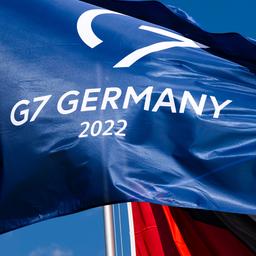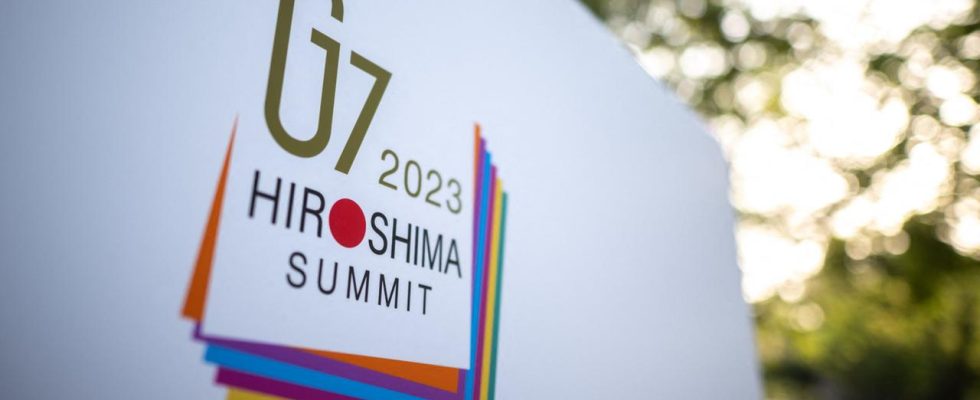At the G7 summit, the EU and the economically strong democracies stand close together on aid to Ukraine and sanctions against Russia. But when it comes to climate protection and China policy, differences have to be overcome in Japan.
The war and the climate determined last year’s G7 meeting at Schloss Elmau and they will shape the summit in Hiroshima. In both areas, the EU is coordinating closely with the club of the seven economically strong democracies – for example on punitive measures against Moscow: trade restrictions, oil embargo, account freezes.
But financial sanctions only have a limited effect and companies circumvent export bans by exporting to Russia via third countries, explains Guntram Wolff, director of the German Council on Foreign Relations (DGAP) and Europe expert: “In this respect, the sanctions are a really controversial issue, where the G7 have reached their limits and actually have to achieve more. From the Hiroshima summit, I hope that the EU and G7 will coordinate closely and pull together.”
Rebuilding with united forces
In any case, they are doing so with the financial aid for Ukraine and the planned reconstruction of the country. At a conference in Berlin last autumn, the Federal Government, the EU and the G7 launched a Marshall Plan and set up a donor platform.
The task is daunting: The World Bank estimates the costs over the next ten years to be around 370 billion euros. EU Commission President Ursula von der Leyen emphasizes that this is more than a country or an organization can handle:
“We need everyone on board: G7, EU and the rest of Europe, strong partners like the US, Canada, Japan, the UK, South Korea, Australia, New Zealand and many more.”
Differences in climate policy
According to environmental organizations, the EU and G7 countries are a long way from achieving their respective national goals in climate policy. But the EU has committed to expanding emissions trading and sourcing 45 percent of its energy from solar, wind and water by 2030. The G7, in turn, decided in Elmau to make power generation largely CO2-free.
According to Chancellor Olaf Scholz, the seven major industrial nations want to build on this at the Hiroshima summit. That won’t be easy: there is still no timetable for the end of climate-damaging coal-fired power generation and loopholes remain because Japan, the host of the summit, relies heavily on coal. Nuclear power is also still important as a low-emission form of energy generation for many EU and G7 countries, while Germany has opted out.
Also causing controversy is the Inflation Reduction Act, Washington’s multi-billion dollar subsidy program to make US industry more climate-friendly. The EU welcomes this, but complains about the disadvantages for European companies.
How do you feel about China?
Different nuances are also evident in dealings with China: the USA is urging its partners to take a hard line in dealings with Beijing – as is Japan, which views the military presence of its large neighbor in the Indo-Pacific region with great concern.
From the EU’s point of view, China is a system rival, but also an important supplier and sales market: Last year, China was the third largest partner for EU goods exports and the largest partner for EU goods imports. For Germany, China was Germany’s most important trading partner in 2022 for the seventh time in a row.
According to Commission President von der Leyen, decoupling from China is neither feasible nor in Europe’s interest. But she wants to limit the dangers that arise for Europe as a result of excessive dependencies. Von der Leyen came up with the formula at the end of March: “De-risk, not de-couple.”
Chancellor Scholz made this formula his own in his Strasbourg speech on Europe Day, and it could sound something like this in the G7 final declaration.

The G7
The “Group of Seven” (G7) is an association of the seven most important industrial countries: Germany, Great Britain, USA, Canada, France, Japan and Italy. The EU Commission is present as an observer. The presidency rotates annually between the member states. The country holding the presidency sets the group’s priorities, hosts and organizes the summits. Last year Germany chaired the G7; the last meeting of the group was in June 2022 in Elmau, Bavaria.
De-risking: forging new alliances
In the search for valuable raw materials, the G7 countries want to distance themselves from Beijing and make offers to third countries: Unlike China, which only extracts ores and minerals from the soil in the global South, the G7 want to process some raw materials locally. DGAP expert Wolff expressly welcomes the fact that Scholz had already invited representatives of important emerging countries to Elmau. The West must seek alliances: “China is doing it, the West must do it too. That also includes making offers, who ultimately contribute, to form a broader global coalition against Russia’s aggressive war in Ukraine.”
In Wolff’s view, the Russian war of aggression in Ukraine has brought the EU and G7 closer together and given the club of economic powerhouses a new reason to exist. Europe’s interest at the summit is to confirm the international alliance against the aggressor Russia.

